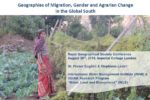Publications
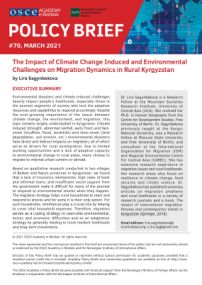
- Policy Brief No. 70: The Impact of Climate Change Induced and Environmental Challenges on Migration Dynamics in Rural Kyrgyzstan.
Environmental disasters and climate induced challenges heavily impact people’s livelihoods, especially those in the poorest segments of society who lack the adaptive resources and capabilities to respond accordingly.
Read more..
 Marocains de l’extérieur – 2021 (Moroccans Abroad 2021)
Marocains de l’extérieur – 2021 (Moroccans Abroad 2021)
The Royal Speech of August 20, 2022 once again posed the question of Moroccans abroad, inviting the State and society as a whole to reflect and act to support this community, estimated today at 5 million. of people spread over four continents. Among the tools put at the service of this knowledge, the series “Moroccans Abroad”, published by the Hassan II Foundation for Moroccans Residing Abroad, maintains its regular publication every 4 years and today publishes its fifth edition corresponding to 2021. Remember that the main purpose of this series is to follow the continuous changes of this migration and its problems, identifying its new trends through the most up-to-date panoramas of the different Moroccan communities living abroad.
Read more…

- Seven Country Reports
Reforms in China in the 1980s promoted growth and economic strength in many sectors. These changes contributed to reshaping labor mobility in the country including internal movement between rural and urban areas. Large scale migration from inland regions to coastal areas began in the 1990s and, by 2020 numbers had reached 286 million (China National Bureau of Statistics).
Read more..
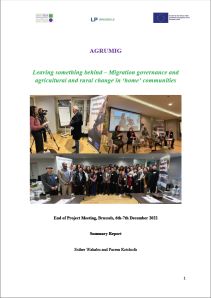 Summary Report AGRUMIG End of Project Meeting, Brussels, 6th-7th December 2022: Leaving something behind – Migration governance and agricultural and rural change in ‘home’ communities
Summary Report AGRUMIG End of Project Meeting, Brussels, 6th-7th December 2022: Leaving something behind – Migration governance and agricultural and rural change in ‘home’ communities
The International Water Management Institute (IWMI) (https://www.iwmi.cgiar.org/), in collaboration with partners of the AGRUMIG project, organised an end-of-project meeting on December 6 and 7, 2022, in Brussels, Belgium. The meeting sought to examine research results and implications for policy across the project’s seven focus countries – China, Ethiopia, Kyrgyzstan, Moldova, Morocco, Nepal, and Thailand, demonstrating how better-informed policy can support more effective migration governance.
Read more..
- Make migrants a core part of rural development: AGRUMIG Policy Dialogue Meeting Report, Kyrgyzstan
The record-breaking levels of migration in today’s globalized economy are deeply reshaping social, economic, and political settings in both sending and receiving countries. For policymakers, practitioners, and migration researchers, understanding and seeking efficient adaptation policies in such a fast-changing environment is a key priority. The AGRUMIG project aims to support policy solutions to this complex situation, examining the relationship between migrations and “sending communities” in low and middle-income countries, with particular attention to transformations taking place in the agrarian sector.
Read more..
- Examining migration governance: evidence of rising insecurities due to COVID-19 in China, Ethiopia, Kyrgyzstan, Moldova, Morocco, Nepal and Thailand.
The COVID-19 pandemic has significantly changed the context of global migration. From a migration perspective, the pandemic is a source of insecurities that challenge migrants, their livelihoods and migration governance. Meanwhile, curtailment in movement has led to economic decline affecting labour markets. For migrant origin and hosting countries, this poses multidimensional development challenges.
Read more..
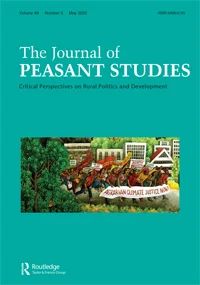
- Migration, environmental change and agrarian transition in upland regions: learning from Ethiopia, Kenya and Nepal.
This paper analyses the relationship between cyclical labour migration and agrarian transition in the uplands of Nepal, Ethiopia and Kenya. It shows that while migration decision-making is linked to expanding capitalist markets, it is mediated by local cultural, political and ecological changes.
Read more..
- Examining migration governance: evidence of rising insecurities due to COVID-19 in China, Ethiopia, Kyrgyzstan, Moldova, Morocco, Nepal and Thailand.
The manuscript ‘Examining migration governance: evidence of rising insecurities due to COVID-19 in China, Ethiopia, Kyrgyzstan, Moldova, Morocco, Nepal and Thailand’, authored by Asel Murzakulova (UCA), Mengistu Dessalegn (IWMI), and Neelambari Phalkey (UoB), was assessed by reviewers for the Journal Comparative Migration Studies, and was recommended for publication by the journal’s editor. The writing team worked on the requested revisions and consulted with the Steering Group before submitting the final version of the article at the beginning of July 2021. The paper is based on rapid research undertaken by the AGRUMIG consortium in 2020.
- AGRUMIG China Team publication ‘Mechanisation and efficiency in rice production in China.
Dr Shi Min, a member of the South China Agricultural University (SCAU) AGRUMIG team, has had a paper accepted by the Journal of Integrative Agriculture. The paper addresses the issue of mechanisation as a primary adaptation strategy – and is from AGRUMIG field sites. The findings confirm that mechanisation is unlikely to significantly impact yields, especially in fragmented plots – however, it is a necessity for dealing with labour scarcity. The paper’s policy recommendations regarding land transfer market development and mechanised chemical application also have relevance for AGRUMIG’s policy work in China. The full reference is: ‘Mechanisation and efficiency in rice production in China’ in the Journal of Integrative Agriculture 20(7): 2-14.
- Comparative Migration Studies article acceptance.
The manuscript ‘Examining migration governance: evidence of rising insecurities due to COVID-19 in China, Ethiopia, Kyrgyzstan, Moldova, Morocco, Nepal and Thailand’, authored by Asel Murzakulova (UCA), Mengistu Dessalegn (IWMI), and Neelambari Phalkey (UoB), was assessed by reviewers for the Journal Comparative Migration Studies, and was recommended for publication by the journal’s editor. The writing team worked on the requested revisions and consulted with the Steering Group before submitting the final version of the article at the beginning of July 2021. The paper is based on rapid research undertaken by the AGRUMIG consortium in 2020.

- UCA-MSRI Research Paper No. 7:
Rural Migration in Kyrgyzstan: Drivers, Impact and Governance
The development of Kyrgyzstan reveals two important trends: declining agricultural production and a steady increase of remittances from labor migration. These trends suggest a transformative effect of migration, negating an overly simplistic investment effect of financial remittances on long standing livelihood activities.
Read more..
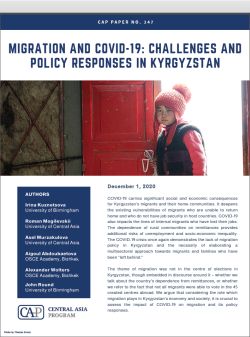
- CAP Paper No. 247:
Migration and COVID-19: Challenges and Policy Responses in Kyrgyzstan
Migration is a part of everyday life for hundreds of thousands of Kyrgyzstan’s citizens. People move internally from rural areas to Bishkek and Osh for long-term employment or temporary work, and many go to Russia, Kazakhstan, Turkey, and other countries.
Media
Animated Video: Impact of Migration on Rural Development in Kyrgyzstan
Majlis Podcast: Bad News For The Remittance-Dependent In Central Asia
Irina Kuznetsova of the AGRUMIG Kyrgyzstan team contributes to a conversation on the drop in remittances to Central Asian countries. She discusses recent AGRUMIG project findings on the impact of Covid-19 on migrants from Kyrgyzstan and their families as well as shares her observations about Tajikistan.
Resources
Covid-Migration News Database, University of Vienna
How do international and national news outlets report on the impacts of Covid-19 on migrants? The database provides 3175 news headlines from 213 countries (as of 01/2021), sorted by e.g. country origin and destination.









